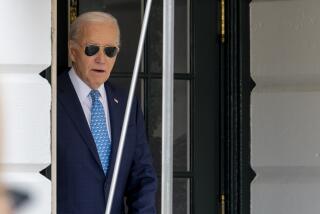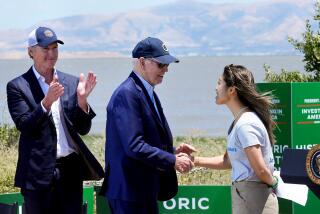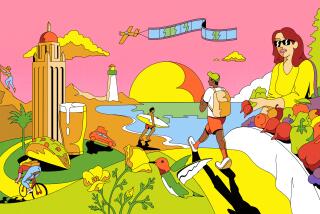Bay Area Starts Preparing for a Visit by Gorbachev in June
- Share via
SAN FRANCISCO — Stanford University professors were polishing up their economic theories and local officials were reserving prime hotel space as the Bay Area began to gear up Tuesday for a visit next month by Soviet President Mikhail S. Gorbachev.
Gorbachev would become the first leader of the Soviet Union to visit the Bay Area since Nikita Khrushchev in 1958. During that stay, Khrushchev chose the swank Mark Hopkins Hotel.
Although details of Gorbachev’s itinerary have not been disclosed, Charlotte Maillard-Swig, chief of protocol for San Francisco, took the liberty of reserving a block of rooms across the street at the Fairmont, on the chance that Gorbachev might stay at that Nob Hill establishment.
“We want to be prepared,” Maillard-Swig said.
Gorbachev’s schedule calls for him to arrive in the Bay Area on June 3, after meeting with President Bush in Washington, and after a stop in Minneapolis. He plans to go to Stanford University for two hours on June 4, and leave later that day.
“He’s the man of the decade and he’s coming to our school,” said Robin Roos, a Stanford freshman from Laguna Beach. “I hear he’s a great speaker, even though I’m not going to be able to understand him.”
Stanford President Donald Kennedy said he received confirmation on Tuesday from Soviet Ambassador Yuri V. Dubinin that Gorbachev would visit the campus. The university was asked to take “the first step” by proposing an agenda.
“There is the possibility that Gorbachev will want to give a public address and we will accommodate him if that is the case,” Kennedy said.
Gorbachev is expected to meet with Stanford and Hoover Institution scholars to discuss such heady topics as economic restructuring, the environment and arms control. The Hoover Institution on the Stanford campus houses the world’s largest collection of material on the 1917 Bolshevik Revolution.
But Kennedy said another reason Gorbachev might be attracted to Stanford is “that George Shultz is here.”
Former Secretary of State Shultz is a professor and fellow at the Hoover Institution. The conservative think-tank has taken a lead role in political theorizing and economic policy-making, particularly during the 1980s. Several members of former President Ronald Reagan’s inner circle of advisers came from Hoover and several have since returned to it. Two Stanford professors, Michael Boskin and John Taylor, serve on Bush’s Council of Economic Advisers.
Hoover Fellow Charles Hill noted that several researchers are studying the Soviet Union’s attempted economic restructuring. “It’s a tricky issue and we’ve got people who can offer him Marshall Plan ideas on how to do it.”
In San Francisco, officials had received no word from the Soviets that Gorbachev would be coming. But Scott Shafer, press secretary to San Francisco Mayor Art Agnos, said U.S. sources had confirmed Gorbachev’s plan to arrive in the city June 3, visit Stanford June 4 and leave that same day.
Given that demonstrations are common in San Francisco, officials were trying to anticipate who might be protesting.
“You might see a right-wing demonstration,” Shafer said. “But since there aren’t a lot of right-wingers in this city, they’d have to import them. . . . He’s just not a good bad guy.”
Californians with roots in the troubled Baltic region welcomed Gorbachev’s visit as an opportunity to educate the Soviet leader about that area’s quest for independence.
“The welcome wagon will be out, definitely,” said Danute Mazeika of the Baltic American Freedom League. “It’s a very pleasant surprise because it opens the dialogue even more.”
Although details of Gorbachev’s visit remained fuzzy, local business executives were nonetheless excited about the prospect of his arrival.
“His interest is very strong in coming to San Francisco,” said Harry Orbelian, senior vice president of the San Francisco Chamber of Commerce and a Soviet immigrant who has met with Gorbachev twice.
Orbelian said the chamber proposed an agenda that had the Soviet president meeting over breakfast and lunch with bankers and industrialists, and attending a reception and dinner in the evening.
“I think it will help tremendously our business,” Orbelian said. He said that “from a standpoint of propaganda,” a visit from the Soviet leader would dispel doubts about San Francisco that linger from last year’s earthquake and emphasize that the city remains a desirable place to conduct international business.
Times researcher Norma Kaufman contributed to this story.
More to Read
Sign up for Essential California
The most important California stories and recommendations in your inbox every morning.
You may occasionally receive promotional content from the Los Angeles Times.













